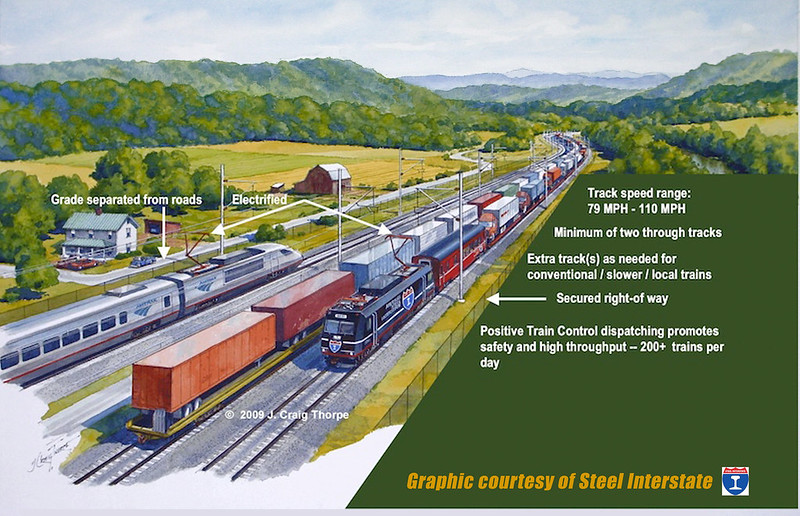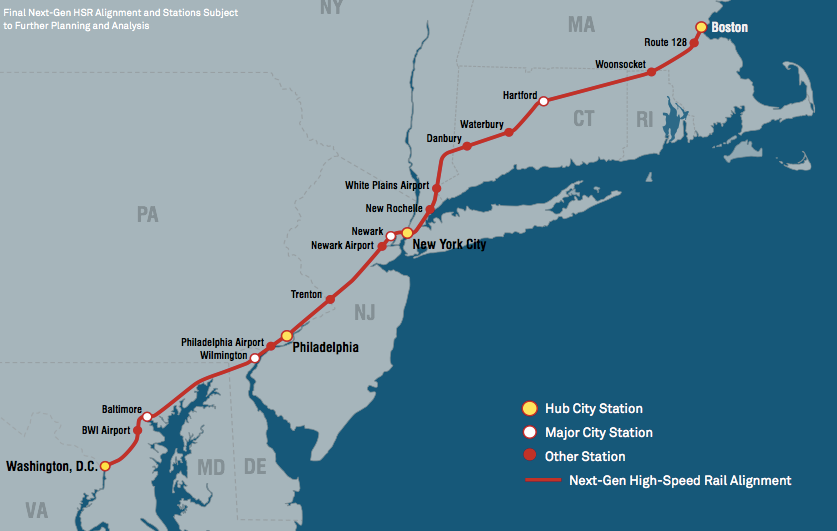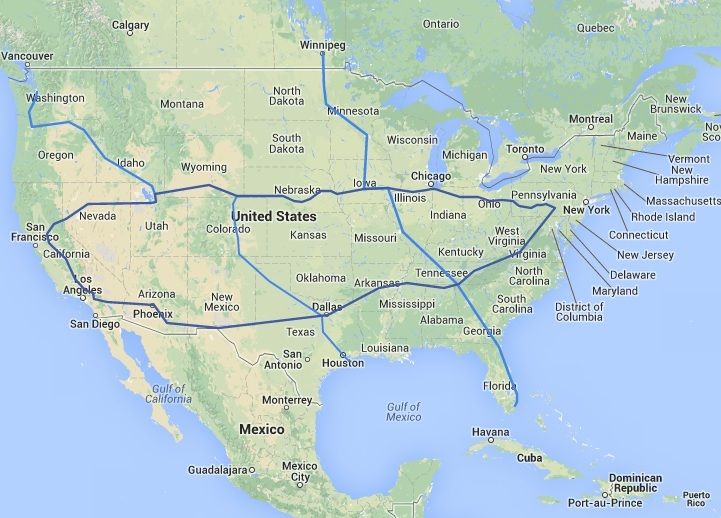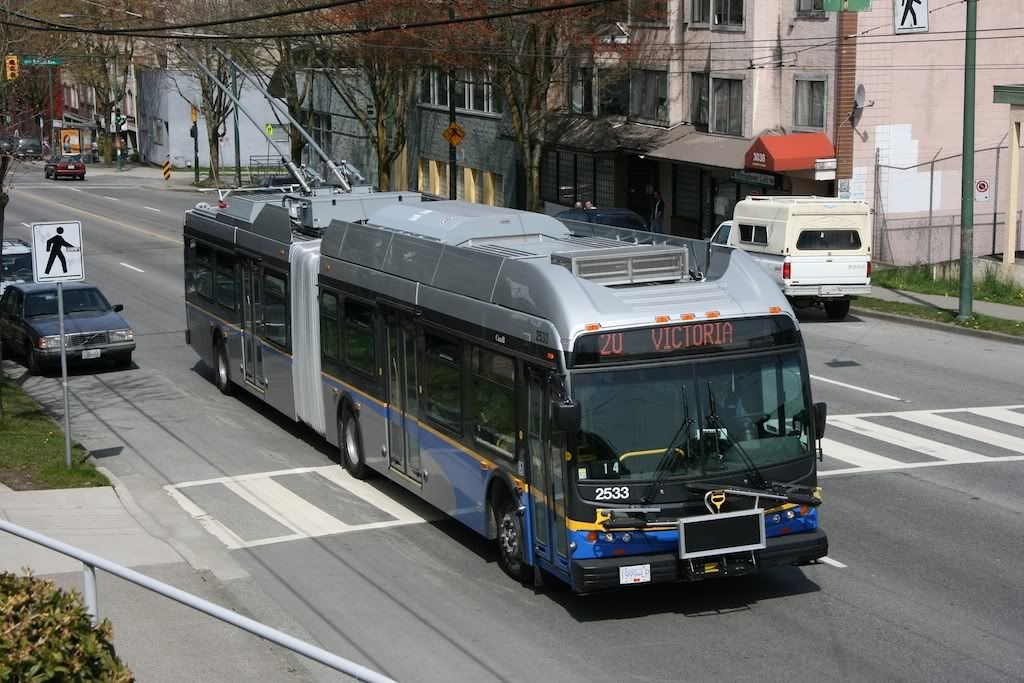So, we are two weeks into the Trump administration, and we see a runaway rush to promote economic suicide through pandering to oil and coal companies. Because, it would seem, the slogan was really “Make America Great At Propping Up Dead End Industries Again”, but #MAGAPUDEIA” had to be edited down, both for length and …
Tag: rail electrification
Oct 09 2016
Sunday Train: Going to Tianjin by Subway and High Speed Rail
OK, so after years of (off and on) writing about High Speed Rail, I’ve finally been on a High Speed Rail train … on the Beijing – Tianjin Intercity Railway. Though I have to say that I went to Tianjin by Subway and High Speed Rail, given that substantially more time was spent en-route on …
Aug 07 2016
Sunday Train: Adventures on the Beijing Subway
I have ridden the Beijing Subway and lived to tell the tale! Click through for scary youtube clip of the Beijing Subway Of course, the youtube clips you might be able to find about incredible overcrowding on the Beijing subway is just part of the story. Indeed, when riding on my “home” subway line, I …
Feb 16 2015
Sunday Train: Future of Rail Technical Symposium, Washington DC. 3 Feb, 2015
 Last week in Washington DC, your Sunday Train correspondent was able to attend the “Future of Rail Symposium” held in Washington DC. The presenters discussed various aspects of building a Steel Interstate corridor, including the Steel Interstate concept, a discussion of electrified rail around the world, why rely on electricity rather than LNG for major backbone corridors, the engineering and economics of electrification in North America, an approach to financing an initial Steel Interstate corridor without requiring new legislation to be passed through our gridlocked Federal government, vehicle and track considerations of the “Rapid Freight” rail component of the Steel Interstate, the labor dimension and the need for a new social contract with Rail Labor, and a final presentation on the “Solutionary Rail” proposal by the Backbone Campaign to establish a Steel Interstate on the BNSF Northern Transcon corridor.
Last week in Washington DC, your Sunday Train correspondent was able to attend the “Future of Rail Symposium” held in Washington DC. The presenters discussed various aspects of building a Steel Interstate corridor, including the Steel Interstate concept, a discussion of electrified rail around the world, why rely on electricity rather than LNG for major backbone corridors, the engineering and economics of electrification in North America, an approach to financing an initial Steel Interstate corridor without requiring new legislation to be passed through our gridlocked Federal government, vehicle and track considerations of the “Rapid Freight” rail component of the Steel Interstate, the labor dimension and the need for a new social contract with Rail Labor, and a final presentation on the “Solutionary Rail” proposal by the Backbone Campaign to establish a Steel Interstate on the BNSF Northern Transcon corridor.
Sep 01 2014
Sunday Train: NEC High Speed Rail for Under $20b (from 15Jul2012)
Sunday Train this week is a re-run from 15 July, 2012
Burning the Midnight Oil for Living Energy Independence
 One of the transit bloggers that I enjoy reading is Alon Levy who blogs his observations on a variety of transit topics at Pedestrian Observations . Following the important California HSR funding vote in the California State Senate and the excitement leading up to it, I thought I’d like to take a look at the proposed Express HSR system for the states of the Northeast Corridor.
One of the transit bloggers that I enjoy reading is Alon Levy who blogs his observations on a variety of transit topics at Pedestrian Observations . Following the important California HSR funding vote in the California State Senate and the excitement leading up to it, I thought I’d like to take a look at the proposed Express HSR system for the states of the Northeast Corridor.
Of the $53b cost of the proposed San Francisco to Los Angeles Express HSR corridor seems hefty ~ and it seems even heftier when it shows the Year of Expenditure headline value of $68b ~ then the proposed Northeast Corridor states Express HSR will seem massive.
However, Alon claims:
Northeast Corridor HSR, 90% Cheaper
…
In contrast with this extravaganza, it is possible to achieve comparable travel times for about one tenth the cost. The important thing is to build the projects with the most benefit measured in travel time reduced or reliability gained per unit of cost, and also share tracks heavily with commuter rail, using timed overtakes to reduce the required amount of multi-tracking.
This sounds like an intriguing possibility … but is it realistic? Or is it wishful thinking? Follow me below the fold, and then let’s discuss it.
May 06 2014
Sunday Train: Freight Transport and the Highway Funding Crisis
Belated edition ~ technical difficulties interfered with posting to Soap Blox blogs
 We are going to be hearing increasingly this year about the Highway Funding Crisis. Much of that discussion will be directed toward exploiting the political leverage that our car addiction gives to the Highway Lobby.
We are going to be hearing increasingly this year about the Highway Funding Crisis. Much of that discussion will be directed toward exploiting the political leverage that our car addiction gives to the Highway Lobby.
But there is the other side of the Highway Funding Crisis, which is freight transport. Our freight transport system has been as deliberately addicted to road funding as our passenger transport system, and in the process is quite heavily addicted to diesel fuel.
Now, the Sunday Train has frequently tackled this issue from the side of the physical unsustainability of our dependence on petroleum based fuels for a majority of our transport. However, its also the case that the system of public finance upon which we built our road transport system is becoming more and more financially unsustainable.
Nov 11 2013
Sunday Train: Will We Be Ready for the Great 2017 HSR Policy Unlock?
 I’ve posed a question in the title of this week’s Sunday Train that I have no intention of answering myself.
I’ve posed a question in the title of this week’s Sunday Train that I have no intention of answering myself.
The first thing you may have noted is that the title presumes a “Great 2017 Policy Unlock” that is by no means certain. And assuming an event in a title as a lead-in to talking about the likelihood of that event is a long-standing internet link-bait practice.
The second thing, however, is that even that would be focusing on political fortune telling, and the Sunday Train is not normally about making guesses about what will happen. It is more often focused on policy in the sense of thinking about what should happen and, sometimes, what we can do to make it more likely to happen.
The foundation of the Sunday Train is the premise that on our current track, with our current transport and energy systems, we are driving the possibility of retaining a national, modern, industrial economy over a cliff. We are doing that in three ways:
- Our Energy Production and our Transport Systems combined are responsible for a majority of our CO2 emissions, and even if we converted everything else in our economy to be 50% carbon negative ~ sequestering 50% as much CO2 as it present emits ~ our current Energy and Transport systems would be sufficient to drive the globe far enough into Climate Crisis to bring down our national industrial economy;
- And the world has hit Peak Petroleum Production, as is clear from the variety of “scraping the bottom of the barrel” oil and oil-replacement exploitation efforts taking place today, and has started to slide down the other side of the peak, so that an economy as exposed as our own to oil price shocks is going to lose massive ground compared to competing economies that are already positioned to shelter themselves from the impact of oil price shocks
- And we are heading toward the Energy Return on Investment cliff for the fossil fuels we produce ourselves that our current Energy and Transport systems relies upon, and as we slide down that cliff, the economic benefit of that domestic fossil fuel production will progressively decline, leaving us behind any national economies or continental economic systems that seriously pursue sustainable, renewable energy sources that are seeing growing Energy Return on Investment, due to technological progress.
Pick your poison, since any one of them is serious enough to either drive the US economy from the ranks of the core economies into the ranks of the semi-peripheral economies, or even to eliminate our ability to retain a national economy at all.
Given that premise, the “odds of success” in a political forecasting sense is not the focus of the Sunday Train. The focus is rather the prospect for improving those odds. Whether that is improving the odds from a 50% chance of success, or a 1% chance of success to a 2% chance of success, in either event it is worth the investment in effort to try … whether the mere 1/5 improvement in the odds, or the more impressive doubling in the odds, what is won in the event of a win is such a jackpot that its worth the effort to simply improve the odds a little bit.
Oct 28 2013
Sunday Train: Steel Interstate Revolution
 The Steel Interstate is a proposal to pursue dramatic gains in the energy efficiency of long haul freight transport in the United States, resulting in:
The Steel Interstate is a proposal to pursue dramatic gains in the energy efficiency of long haul freight transport in the United States, resulting in:
- Substantial reductions in Petroleum Imports;
- Substantial reductions in Greenhouse Gas emissions;
- Substantially improved protection from Petroleum Supply interruptions;
- Improved productivity for North American manufacturing; and
- Substantial reductions in damage to the existing Asphalt Interstate System
How can it promise all of this? By mining gross inefficiency. The United States has one of the most energy inefficient systems of moving freight long distances available under current technology, and we combine that with an economy that relies heavily on moving freight long distances.
Some of the specific sources of energy efficiency are:
- Moving cargoes in linked electric freight trains offers less air resistance than moving cargoes in individual trucks, because the freight car ahead provides a slipstream for the freight car immediately behind;
- Steel wheel on steel rail has less rolling resistance than rubber tire on asphalt road;
- Electric motors are more efficient than diesel or gasoline internal combustion engines; and
- When braking, electric trains can put a load on their electric motors and generate power, feeding it back onto the line
Overall, long haul electric freight is around 15 times more energy efficient than long haul diesel semi freight. I tend to express this as over ten times the energy efficiency, to allow leeway for possibly longer routings when taking advantage of the Steel Interstate.
Long haul electric freight trains are also more space efficient than long haul truck transport. Freight demands that would require multiple lanes each way just for truck traffic can be readily accommodated on a two track mainline route. This can be done while accommodating a mix of 60mph heavy freight and 100mph fast container freight by including regular extended sections of passing track: the difference between passing track and sidings is that on-schedule faster and slower trains using the passing track remain in motion, rather than one sitting still in a siding waiting for the other to pass.
Finally, the operating cost per ton-mile for electric freight for both 60mph heavy freight and 90mph fast freight is enough lower than the operating cost of long haul trucking that the government can fund a National Steel Interstate with interest subsidies alone, with Access Fees and User Fees refunding the original capital cost of the system ~ initially, funding expansion of the system, and finally funding retiring the bonds.
Oct 21 2013
Sunday Train: A Train Running A Profit is Charging Too Much
This is a repeat of a Sunday Train that originally ran on 24 January 2010
 Note that the statement is abbreviated for the title. The full statement is, a common carrier like a train, bus, or plane that running a profit based on passenger revenue while paying its full operating and capital cost is charging too much for its tickets.
Note that the statement is abbreviated for the title. The full statement is, a common carrier like a train, bus, or plane that running a profit based on passenger revenue while paying its full operating and capital cost is charging too much for its tickets.
The radical abbreviation of the title is in part because of the radical abbreviation of the lie that is commonly used as a frame. The lie is that a common carrier like a train, bus or plane that is paying for its full operating and capital costs out of passenger revenue ought to run a profit, commonly expressed as a charge of, “SERVICE_XYZ is losing money, it needs to be reformed!“, which assumes that Service_XYZ is supposed to be making a profit.
And, of course, in the sense described above, if its a common carrier transport service, of course it shouldn’t be making a profit. And further, if under the above conditions, if its making a profit, you’re doing it wrong. In the sense given above, PROFIT=FAIL.
This is problematic under our economic system, because under our economic system, running a profit on the full cost of production normally means that you are free to continue without substantial outside interference, while not making a profit implies that you have to go cap in hand begging for money to operate. So if the main assertion is correct, we have a situation where you can be doing it wrong, and be free to continue, or be doing it right, and have to constantly beg for permission to continue doing it right.
Sep 17 2012
Sunday Train: Breaking Free of the Population Density Myth (2)
Burning the Midnight Oil for Living Energy Independence
crossposted from Voices On The Square, this is a repeat of a Sunday Train from The Hillbilly Report of 4 Oct, 2009 … about an evergreen Liebertarian talking point
 Today, the focus is on one lovely rhetorical ploy used by anti-rail advocates to try to put one over on people with limited experience with trains. This relies on the false framing that “trains is trains”, and uses something that is true about a particular kind of local rail transport to mislead people about 110mph Emerging High Speed Rail in particular.
Today, the focus is on one lovely rhetorical ploy used by anti-rail advocates to try to put one over on people with limited experience with trains. This relies on the false framing that “trains is trains”, and uses something that is true about a particular kind of local rail transport to mislead people about 110mph Emerging High Speed Rail in particular.

Recent Comments